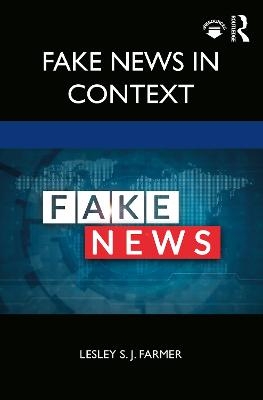
Fake News in Context
Seiten
2020
Routledge (Verlag)
978-0-367-41680-5 (ISBN)
Routledge (Verlag)
978-0-367-41680-5 (ISBN)
This book explains the communication cycle of fake news - how and why it is created, disseminated, accessed, and believed - and how it can be detected. Explaining why people believe it, she shows how various literacies (including news, media, visual, and data) offer concepts and skills that can help interpret fake news.
Fake News in Context defines fake news and sets it within a historical and international context. Helping readers to become more skilled at detecting misinformation, the book also demonstrates how such knowledge can be leveraged to facilitate more effective engagement in civic education.
Distinguishing between fake news and other forms of misinformation, the book explains the complete communication cycle of fake news: how and why it is created, disseminated and accessed. The book then explains the physical and psychological reasons why people believe fake news. Providing generic methods for identifying fake news, Farmer also explains the use of fact- checking tools and automated algorithms. The book then details how various literacies, including news, media, visual, information, digital and data, offer unique concepts and skills that can help interpret fake news. Arguing that individuals and groups can respond and counter fake news, which leads to civic engagement and digital citizenship, the book concludes by providing strategies for instruction and tips for collaborating with librarians.
Including a range of international examples, Fake News in Context will be of interest to teaching faculty, and students of library and information science, communication studies, media studies, politics and journalism. Librarians and information professionals will also find a valuable resource in this book.
Fake News in Context defines fake news and sets it within a historical and international context. Helping readers to become more skilled at detecting misinformation, the book also demonstrates how such knowledge can be leveraged to facilitate more effective engagement in civic education.
Distinguishing between fake news and other forms of misinformation, the book explains the complete communication cycle of fake news: how and why it is created, disseminated and accessed. The book then explains the physical and psychological reasons why people believe fake news. Providing generic methods for identifying fake news, Farmer also explains the use of fact- checking tools and automated algorithms. The book then details how various literacies, including news, media, visual, information, digital and data, offer unique concepts and skills that can help interpret fake news. Arguing that individuals and groups can respond and counter fake news, which leads to civic engagement and digital citizenship, the book concludes by providing strategies for instruction and tips for collaborating with librarians.
Including a range of international examples, Fake News in Context will be of interest to teaching faculty, and students of library and information science, communication studies, media studies, politics and journalism. Librarians and information professionals will also find a valuable resource in this book.
Lesley S. J. Farmer is Professor of Library Media at California State University Long Beach, USA, and the manager of the statewide ICT literacy project. She has authored over 30 books, and edited three other volumes, mainly on library science.
1. Introduction 2. The Communication Context 3. The Discernment Context 4. The Responsibility Context 5. The Literacy Context 6. The Civic Engagement Context 7. The Curriculum Context
| Erscheinungsdatum | 15.01.2021 |
|---|---|
| Zusatzinfo | 4 Tables, black and white; 3 Line drawings, black and white; 3 Illustrations, black and white |
| Verlagsort | London |
| Sprache | englisch |
| Maße | 156 x 234 mm |
| Gewicht | 453 g |
| Themenwelt | Geisteswissenschaften ► Geschichte |
| Mathematik / Informatik ► Informatik ► Theorie / Studium | |
| Mathematik / Informatik ► Informatik ► Web / Internet | |
| Sozialwissenschaften ► Kommunikation / Medien ► Buchhandel / Bibliothekswesen | |
| Sozialwissenschaften ► Kommunikation / Medien ► Medienwissenschaft | |
| ISBN-10 | 0-367-41680-8 / 0367416808 |
| ISBN-13 | 978-0-367-41680-5 / 9780367416805 |
| Zustand | Neuware |
| Haben Sie eine Frage zum Produkt? |
Mehr entdecken
aus dem Bereich
aus dem Bereich
was jeder über Informatik wissen sollte
Buch | Softcover (2024)
Springer Vieweg (Verlag)
37,99 €
Grundlagen – Anwendungen – Perspektiven
Buch | Softcover (2022)
Springer Vieweg (Verlag)
34,99 €
Eine Einführung in die Systemtheorie
Buch | Softcover (2022)
UTB (Verlag)
25,00 €


